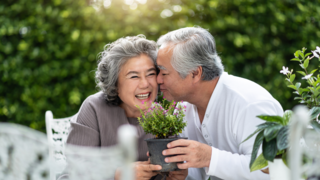Coronavirus Disease 2019
5 Resilience Strategies Seniors Are Using During COVID-19
Despite physical vulnerability to COVID-19, older adults are quite resilient.
Posted January 25, 2021

The COVID-19 pandemic has posed incredible hardship and pain for many people and especially for many older adults and their families. The Centers for Disease Control and Prevention (CDC) tells us that since the beginning of the pandemic, older adults have the greatest risk of requiring hospitalization or dying if they’re diagnosed with COVID-19. This has been one of the most heartbreaking fallouts of the pandemic.
We also know that many older families living with dementia or other significant illness during COVID-19 have been hit especially hard physically, socially, and emotionally. All of this is true, and yet it's only part of the story when it comes to the experience of older adults during the COVID-19 pandemic.
Research over the past year has shown that older adults have, by and large, been psychologically quite resilient during the pandemic.
At the beginning of the pandemic, as a society and as health and mental health providers, our immediate concerns focused on how older adults would respond to COVID-19, and we were especially concerned about how loneliness and isolation would be exacerbated as lockdown measures were implemented.
What we have seen, however, is high rates of resilience among older adults.
What is resilience?
Psychologists define resilience as the process of adapting well in the face of adversity, trauma, tragedy, threats, or significant sources of stress—such as family and relationship problems, life-altering health problems, disasters, COVID-19, etc.
To illustrate this point even further, in a recent New York Times article, Mark Brennan-Ing, a senior research scientist at Hunter College’s Brookdale Center for Healthy Aging, described this phenomenon of older adults coping well with the COVID-19 pandemic as “crisis competence.”
“There’s crisis competence. As we get older, we get the sense that we’re going to be able to handle it, because we’ve been able to handle challenges in the past. You know you get past it. These things happen, but there’s an end to it, and there’s a life after that.”
5 resilience strategies used by older adults during the COVID-19 pandemic
1. Focus on the quality (not quantity) of relationships.
Loneliness and isolation have been a primary concern related to older adults during COVID. Yet, researchers have found that for older adults experiencing isolation, having more close or meaningful relationships seems to be more protective than having more interactions with others.
2. Tap into wisdom and compassion.
Researchers identify "wisdom" as a complex personality trait that includes prosocial behaviors like empathy and compassion, emotional regulation, the ability to self-reflect, decisiveness while accepting uncertainty and diversity of perspectives, social advising, and spirituality.
Several recent studies have shown that the more wisdom we have, the less loneliness we experience. Scientists also found that the component of wisdom that is correlated most strongly (and inversely) with loneliness is compassion and suggest that enhancing compassion may reduce loneliness and promote greater well-being.
How does this relate specifically to older adults? Studies show higher levels of wisdom, especially the compassion component, in older rather than in younger adults.
3. Maintain regular schedules, including hobbies, chores, work, or exercise.
Maintaining a routine offers many benefits: It helps to provide a sense of security and predictability; it helps to reduce stress and anxiety and has the added benefit of helping you sleep better at night. Learn more about keeping a routine and engaging in hobbies and exercise programs tailored just for older adults by downloading the COVID-19 Wellness Guide for Older Adults.
4. Mindfulness to focus on immediate surroundings and needs without thinking beyond the present.
Meditation and mindfulness have been shown to help slow memory loss and the development of dementia-related diseases, help people to cope better with anxiety and stress, and help to reduce loneliness.
5. Access mental health care and support.
Accessing mental health care and support groups when you need them is essential to wellness and resilience. For many people, using their own resources and the strategies listed above may be enough for building their resilience. But at times, an individual might get stuck or need a little extra guidance.
To find a therapist, please visit the Psychology Today Therapy Directory.
Remember, you’re not alone on this journey. Older adults have shown us that during difficult times, we can continue to persevere with the support of loved ones, mindfulness and self-compassion, routine, healthy hobbies, and trusted professionals.
References
How is the Pandemic Affecting the Mental Health of Seniors
Helping Older Adults Find Happiness During COVID-19 Grieving During COVID? These Tips Will Help How Is Ageism Affecting Older Adults During COVID-19? 5 Ways to Deal With Caregiving Stress During COVIDMegan E. Hamm, Patrick J. Brown, Jordan F. Karp, Emily Lenard, Flor Cameron, Alicia Dawdani, Helen Lavretsky, J. Philip Miller, Benoit H. Mulsant, Vy T. Pham, Charles F. Reynolds, Steven P. Roose, Eric J. Lenze. Experiences of American Older Adults with Pre-existing Depression During the Beginnings of the COVID-19 Pandemic: A Multicity, Mixed-Methods Study. The American Journal of Geriatric Psychiatry, 2020; 28 (9): 924 DOI: 10.1016/j.jagp.2020.06.013
Vahia IV, Jeste DV, Reynolds CF. Older Adults and the Mental Health Effects of COVID-19. JAMA. 2020;324(22):2253–2254. doi:10.1001/jama.2020.21753




